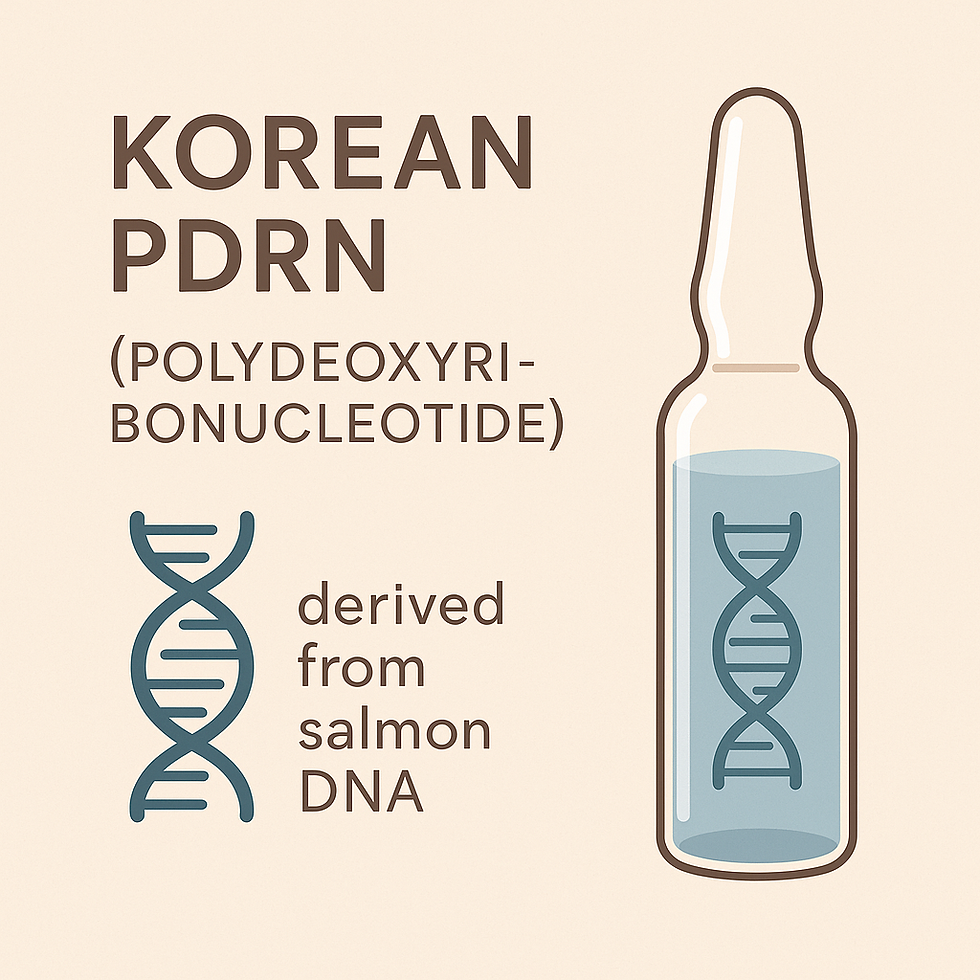Rejuran in Singapore: Korean PDRN Skin Rejuvenation Explained
- fundamentalmedical
- Sep 17
- 3 min read
Among injectable treatments in Singapore, Rejuran has earned strong attention for its ability to restore skin from within. Rejuran belongs to the same family of PN (polynucleotide) injectables as Plinest, but it is often labelled as a Korean PDRN skin treatment. This distinguishes it from other PN products while highlighting its unique regenerative properties.
What is Rejuran and PDRN Skin Rejuvenation?
Rejuran is a PDRN (polydeoxyribonucleotide) injectable derived from purified salmon DNA. PDRN is known for its ability to heal damaged skin and stimulate collagen regeneration, making it one of the most effective injectables for long-term skin health.

When injected, PDRN works at the cellular level to:
Repair and restore damaged tissue
Reduce inflammation and improve skin resilience
Stimulate collagen and elastin production
Enhance skin hydration and elasticity
Because of these regenerative properties, Rejuran is often referred to as a Korean PDRN skin rejuvenation treatment. Unlike dermal fillers that focus on instant volume, PDRN treatments gradually rebuild the skin from within, leading to natural and progressive improvements.
How Does It Work?
When injected, PDRN molecules act as a healing activator:
Reduce skin inflammation
Improve microcirculation and hydration
Support tissue repair and collagen formation
Strengthen the skin barrier for long-term resilience
This makes Rejuran a popular choice in Singapore for patients with acne scars, sensitive skin, and early ageing concerns.
Types of Korean PDRN skinboosters
Patients often ask about the types of Rejuran available. Each version is designed for specific concerns:
Korean PDRN Healer → General rejuvenation, improving texture and elasticity
Korean PDRN S → Targets acne scars and deeper wrinkles
Korean PDRN I → Gentle formula for delicate eye areas
Korean PDRN HB → Combines PDRN with hyaluronic acid for hydration boost
By tailoring formulations, Rejuran offers solutions for a range of skin ageing and damage-related concerns.
Benefits of Korean PDRN Injections
Skin Healing → Repairs damage and strengthens barrier
Collagen Regeneration → Softens fine lines and improves elasticity
Scar Improvement → Reduces acne scars and uneven texture
Hydration → Restores skin moisture from within
Natural Rejuvenation → Results look subtle and progressive
What to Expect from a Korean PDRN Injection
A Rejuran injection session is quick, safe, and minimally invasive:
Consultation → Doctor assesses your skin concerns.
Numbing → Cream applied for comfort.
Micro-injections → PDRN evenly distributed into the skin.
Recovery → Mild redness or bumps fade within 1–2 days.
Results and Longevity
Timeline: Initial results appear within 3–4 weeks, with continued improvement after each session.
Sessions: Usually 3–4 treatments, one month apart.
Longevity: Lasts 6–12 months depending on skin type and lifestyle.
Hyaluronic Acid and Korean PDRN: How Do They Work Together?
In some cases, Korean PDRN can be combined with hyaluronic acid (HA) skin boosters for enhanced results.
Hyaluronic Acid (HA) Skin Boosters → Focus on deep hydration, elasticity, and glow. They plump up the skin by binding water molecules.
Rejuran (PDRN skin booster) → Focuses on repairing damaged cells, collagen regeneration, and skin healing.

When combined:
HA provides immediate hydration and skin plumping.
Rejuran provides long-term repair and rejuvenation.
This synergy makes it possible to address both hydration and structural repair at the same time.
Examples of HA Skin Boosters:
Profhilo (HA injectable for hydration & elasticity)
Skinboosters (Restylane, Juvederm-based)
Other HA-based injectables commonly used in Singapore clinics
Rejuran and Plinest: Same Family, Different Identity
Both Rejuran and Plinest are part of the PN injectable family, sometimes referred to as “PN skin repair treatments.”
Rejuran → Known as the Korean PDRN injectable, widely used in Asia.
Plinest → A European PN skin booster, derived from trout DNA, emphasising skin regeneration and repair.
Although both work by stimulating collagen and repairing skin, their origin and branding differentiate them in the aesthetic market.
Feature | Rejuran | Plinest |
Category | PN (polynucleotide) injectable | PN (polynucleotide) injectable |
Origin | South Korea | Italy (Europe) |
Core ingredient | PDRN (polydeoxyribonucleotide) from salmon DNA | PN (polynucleotide) from trout DNA |
Positioning | “Korean PDRN skin booster” | “European PN skin repair treatment” |
Main focus | Healing, reducing inflammation, skin rejuvenation | Regeneration, repair of scars and damaged skin |
Key uses | Fine lines, acne scars, sensitive/fragile skin, hydration | Acne scars, ageing skin, compromised skin barrier |
Popular subtypes | Healer, S, I, HB | Plinest (classic PN), Newest variants like Plinest Eye |
Longevity | ~6–12 months | ~6–12 months |
Treatment style | Progressive skin healing and rejuvenation | Repair-focused, with regenerative emphasis |
Conclusion
Rejuran, also known as a Korean PDRN skin rejuvenation injection, is a trusted treatment in Singapore for patients seeking natural skin repair, acne scar improvement, and anti-ageing benefits. Together with other PN injectables like Plinest, it forms part of the growing trend of collagen-regenerating skin boosters that improve skin from within.
If you are considering non-surgical rejuvenation, consult with a licensed clinic to determine whether Rejuran PDRN or another PN-based option is best for your skin concerns.
More to Read:
Korean PDRN Healer - https://www.fundamentalaestheticclinic.com.sg/rejuran-healer
Korean PDRN I - https://www.fundamentalaestheticclinic.com.sg/rejuran-i-eye
Korean PDRN S - https://www.fundamentalaestheticclinic.com.sg/rejuran-s
PN Skin Repair - https://www.fundamentalaestheticclinic.com.sg/plinest-treatment



Comments